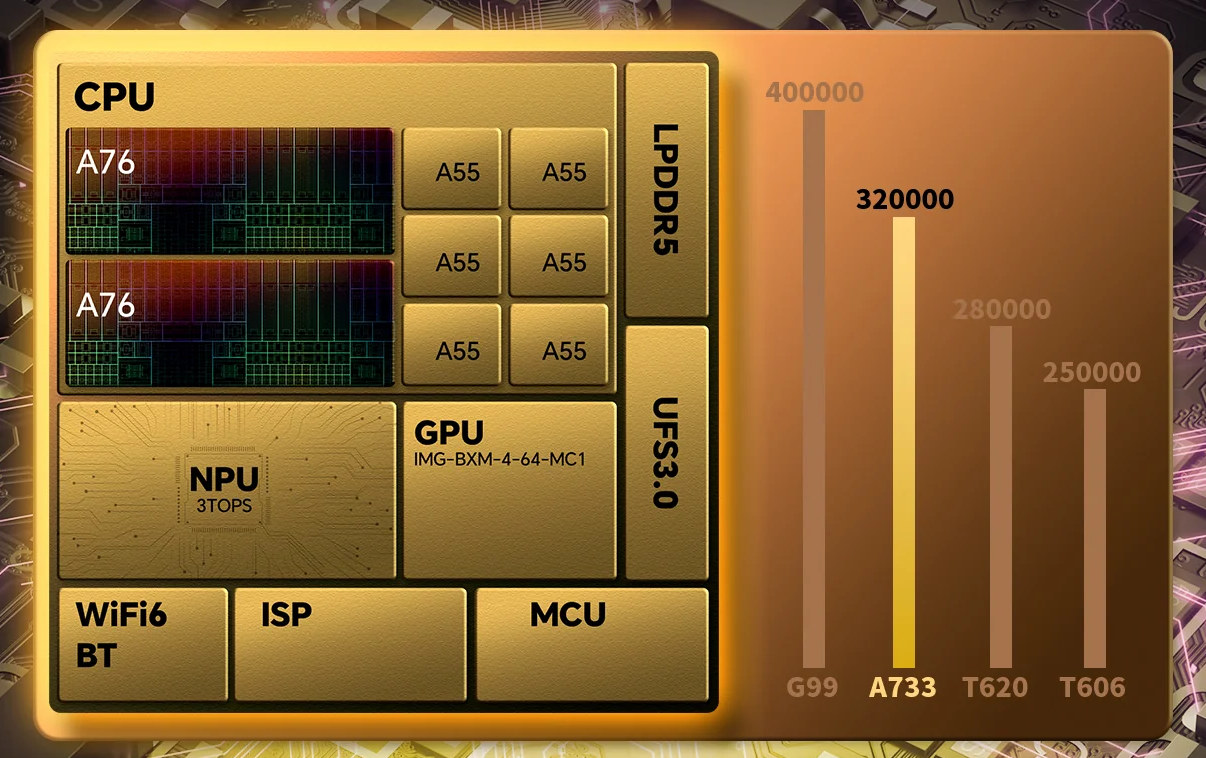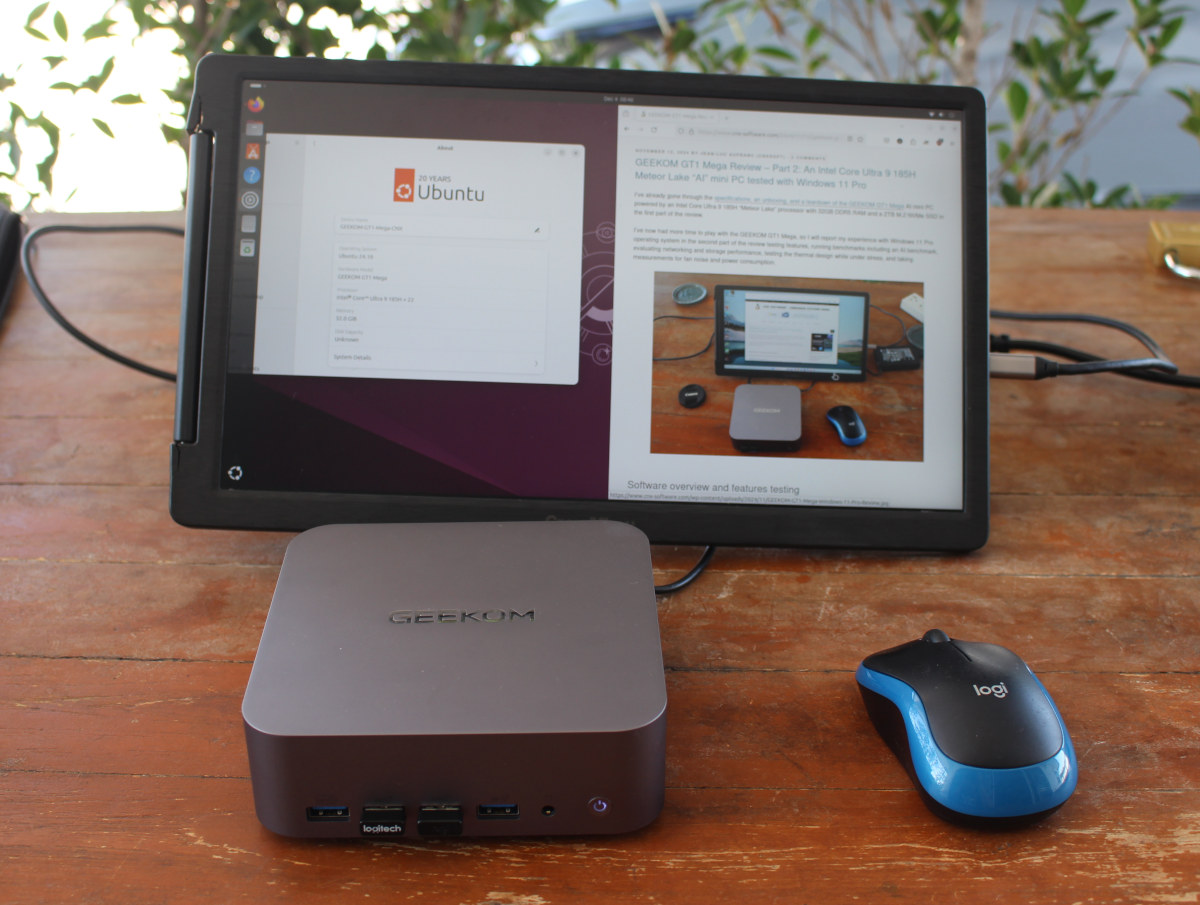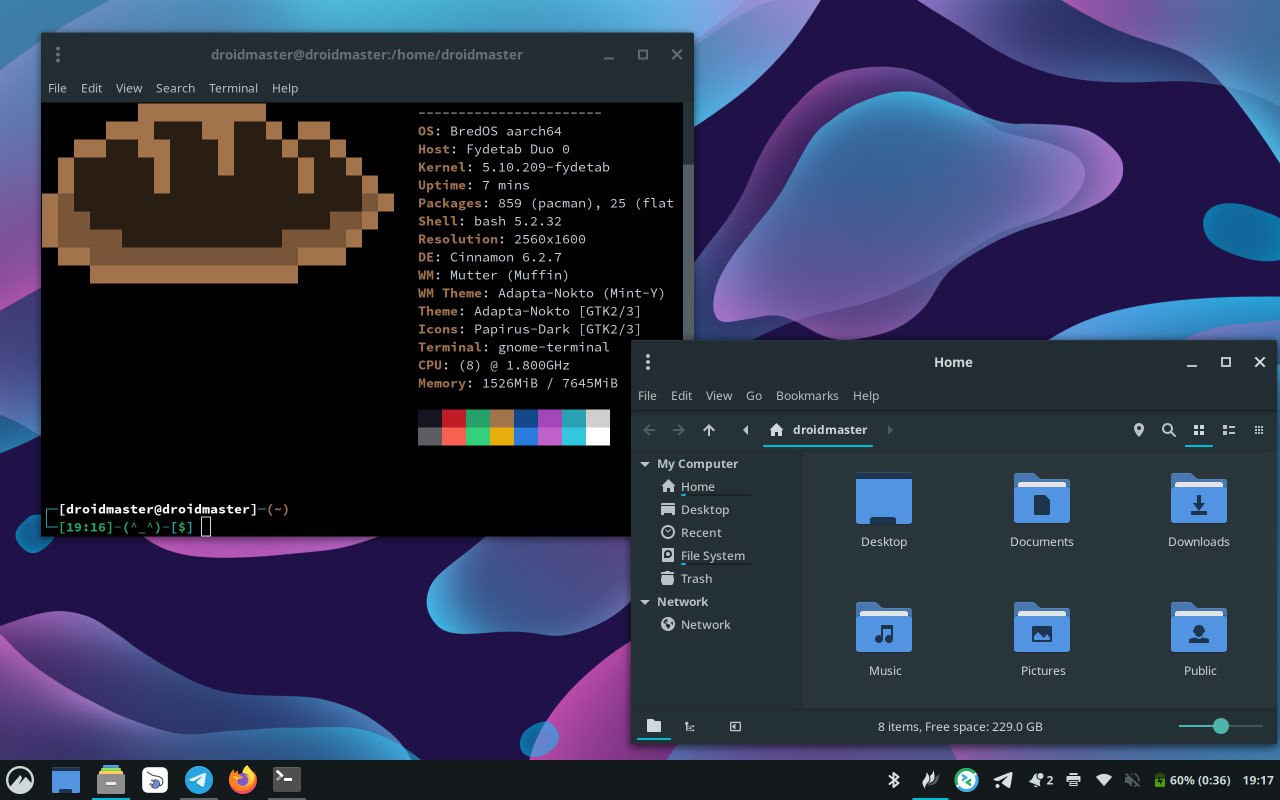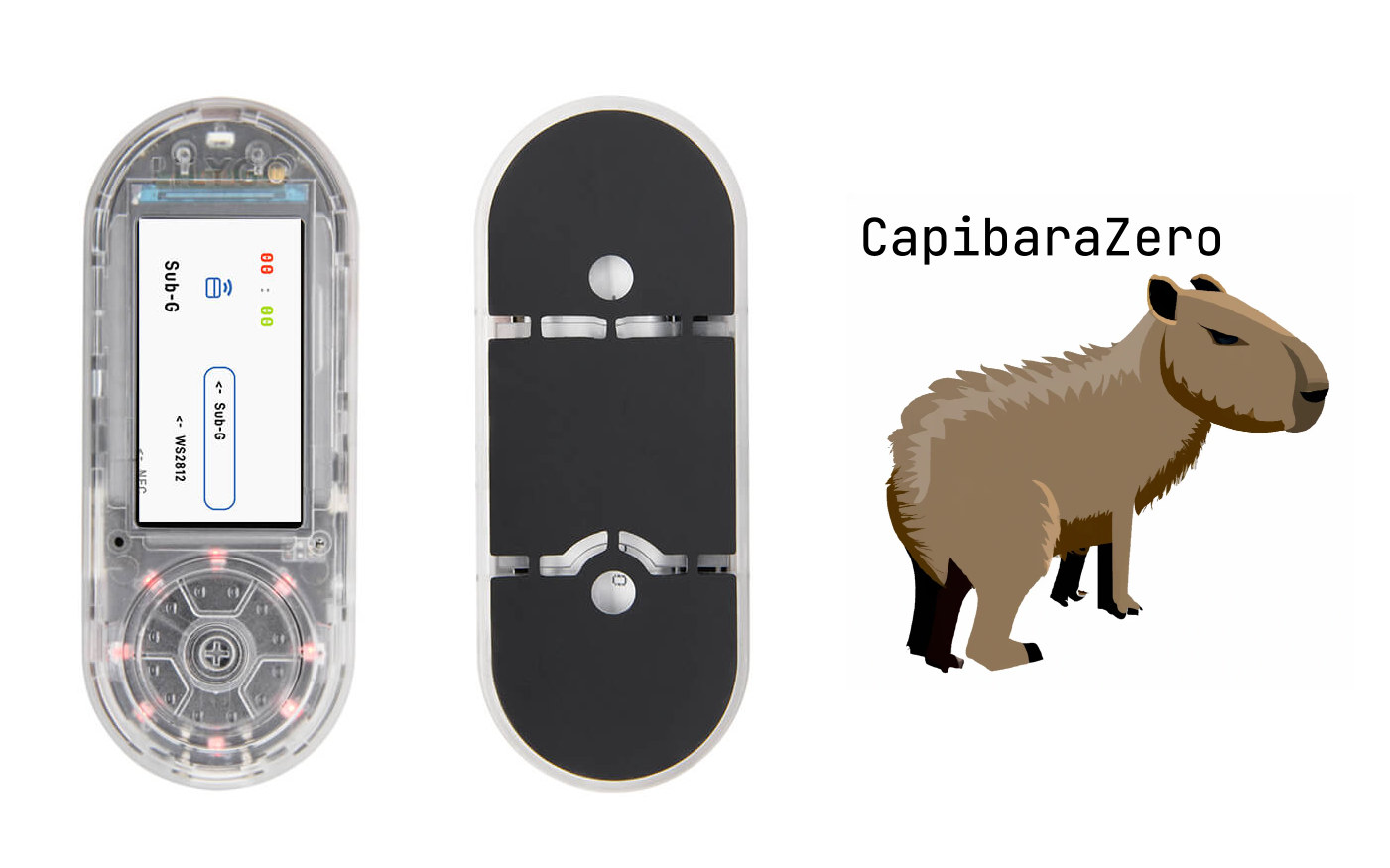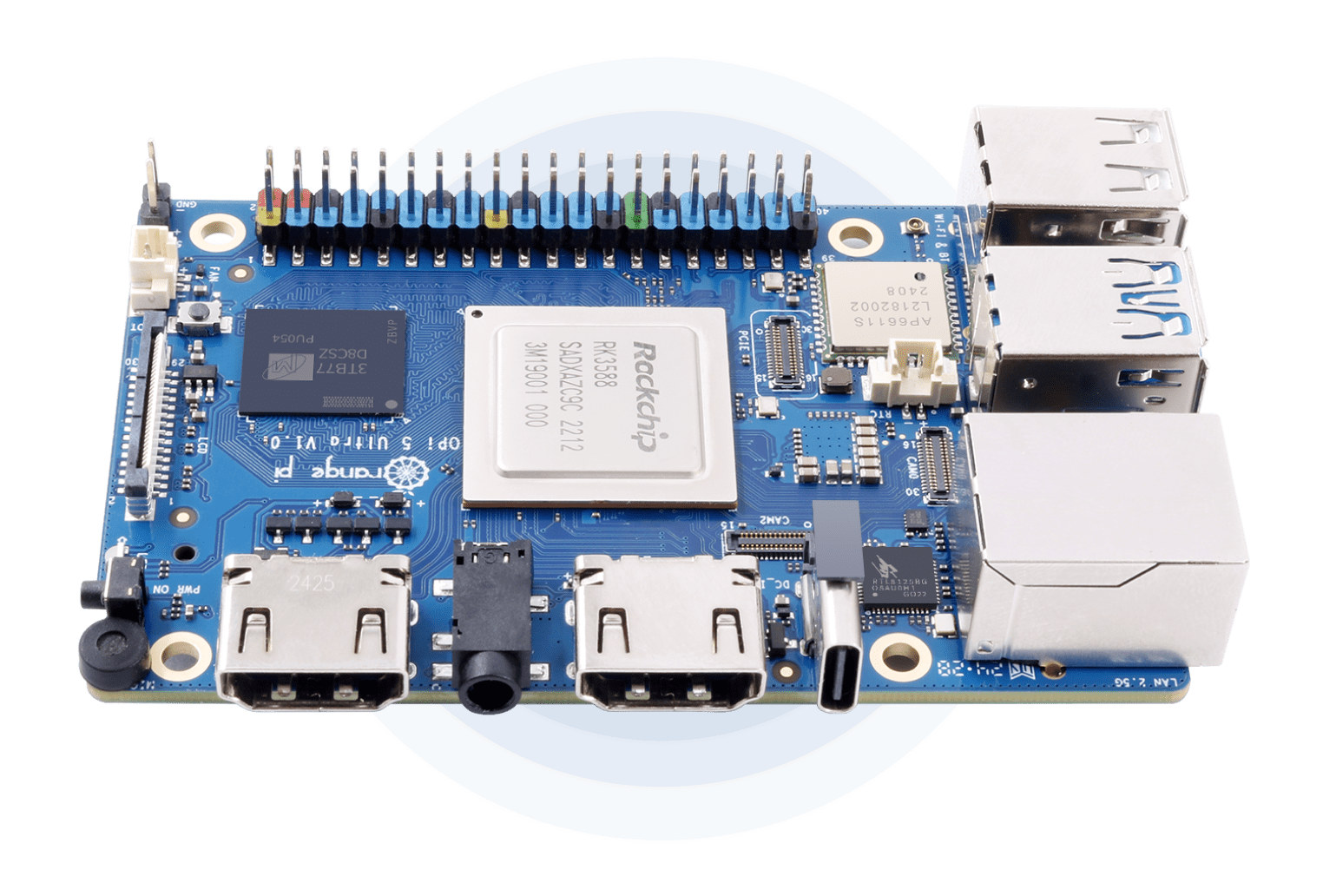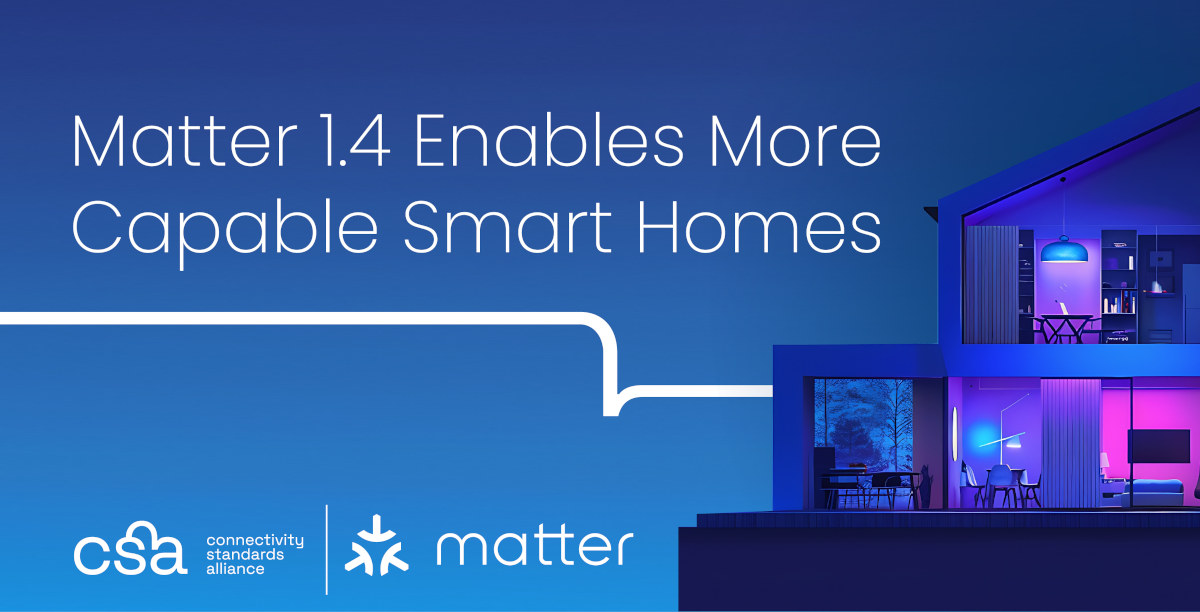Allwinner A733 is an octa-core Cortex-A76/A55 processor with an optional 3 TOPS NPU and support for up to 16GB RAM designed for Android 15 tablets and laptops such as the Teclast P50Ai with a 10.92-inch touchscreen display. With two Cortex-A76 cores, six Cortex-A75 cores, an Imagination BXM-4-64 MC1 GPU, and an NPU, the Allwinner A733 looks very similar to the Allwinner A736 we noted in a roadmap last year. But there’s no news about the A736, so maybe the name was dropped and the Allwinner A733 was launched instead. Allwinner A733 specifications: CPU Dual-core Arm Cortex-A76 @ up to 2.00 GHz Hexa-core Arm Cortex-A55 @ up to 1.79 GHz Single-core RISC-V E902 real-time core GPU – Imagination Technologies BXM-4-64 MC1 VPU 8Kp24 H.265/VP9/AVS2 decoding (no mention of AV1) 4Kp30 H.265/H.264 encoding AI accelerator – Optional 3 TOPS NPU Memory 192 KB SRAM + 512 KB shared SRAM 32-bit LPDDR4/LPDDR4x/LPDDR5 interface […]
GEEKOM GT1 Mega review with Ubuntu 24.10 – Part 3: Linux on an Intel Core Ultra 9 185H “Meteor Lake” mini PC
We’ve already had a look at GEEKOM GT1 Mega’s hardware with an unboxing and a teardown before following up with a thorough review of the Intel Core 9 Ultra 185H mini PC with Windows 11 Pro. After being interrupted by some Raspberry Pi reviews, I finally had the time to test the GEEKOM GT1 Mega with Ubuntu 24.10 to check out how well (or not) it works with a recent Linux distribution. I’ve tested the features of the Meteor Lake mini PC in Linux, ran some benchmarks, evaluated storage and network performance, played 4K and 8K videos on YouTube at various frame rates, went through a stress test to check its thermal design, and finally measured the mini PC’s fan noise and power consumption. Ubuntu 24.10 installation I would usually review mini PCs with the latest Ubuntu LTS version which would currently be Ubuntu 24.04.1. However, since the Intel Core […]
BredOS Arch Linux Arm distribution runs on Rockchip RK3588 single board computers
BredOS is a Linux distribution based on Arch Linux Arm and optimized to run on Rockchip RK3588/RK3588S single board computers (SBCs) with current support for 22 boards from Radxa, Orange Pi, Khadas, and others. Board vendors will usually provide OS images for their SBCs, but the quality and support may be limited, so projects like Armbian and DietPi are maintaining Ubuntu and/or Debian images for popular single board computers. But if you’re an Arch Linux (Arm) fan, there are fewer choices, and you may have to roll your own port for your board. BredOS provides an easy-to-use alternative based on Arch Arm Linux. BredOS highlights (provided by the developers): User-Friendly Interface – A simplified and intuitive user interface for easy navigation and use. Arch-Based – Built on top of Arch Linux, ensuring access to a vast repository of packages and a rolling release model. Arm Support – Optimized for Arm-based […]
Vulkan 1.4 3D graphics and compute API released
The Khronos Group has just announced the release of Vulkan 1.4 cross-platform 3D graphics and compute API. The new release makes some of the optional extensions and features mandatory, adds streaming transfers, and supports 8K rendering on up to eight targets. Minimum hardware limits have also been increased including at least seven maxBoundDescriptorSets and eight maxColorAttachments. Vulkan 1.4 highlights: Streaming Transfers: new implementation requirements to ensure applications can stream large quantities of data to a device while simultaneously rendering at full performance. Previously optional extensions and features critical to emerging high-performance applications are now mandatory in Vulkan 1.4, ensuring availability across multiple platforms. These include push descriptors, dynamic rendering local reads, and scalar block layouts. Maintenance extensions up to and including VK_KHR_maintenance6 are now part of the core Vulkan 1.4 specification. 8K rendering with up to eight separate render targets is now guaranteed to be supported, along with several other […]
Silicon Labs SiWG917Y and SiWN917Y are ultra-low power WiFi 6 and Bluetooth LE 5.4 IoT modules
Silicon Labs SiWG917Y and SiWN917Y are pre-certified, ultra-low power 2.4 GHz WiFi 6 and Bluetooth Low Energy (LE) 5.4 modules made as an extension of the Wireless Gecko Series 2 Arm Cortex-M33 microcontroller family and designed for IoT applications such as Smart Home devices, building automation solutions, healthcare devices, industrial sensors, and asset trackers. The SiWG917Y module is used as a standalone solution where all application code runs on an Arm Cortex-M4 core, and the SiWN917Y module is designed as a Network Co-processor so customers can execute their application on a separate MCU while the wireless module manages WiFi 6 and BLE 5.4. Silicon Labs SiWx917Y modules specifications: Microcontroller MCU Arm Cortex-M4F application core up to 180 MHz (225 DMIPS performance) Arm Cortex-M4 network wireless processor running up to 160 MHz, Accelerators – Integrated FPU, MPU, NVIC, Matrix vector processor (MVP) Memory 672 KB embedded SRAM shared by Cortex-M4 and […]
CapibaraZero firmware enables low-cost Flipper Zero alternatives based on ESP32-S3 hardware
CapibaraZero open-source firmware aims to offer a low-cost alternative to Flipper Zero for ESP32-S3-based hardware platforms and soon other gizmos with ESP32 wireless microcontrollers, notably the LilyGO T-Embed CC1101, similar to the original T-Embed with ESP32-S3 WiSoC, but also featuring a Texas Instruments CC1101 Sub-GHz microcontroller and an NXP PN532 NFC/RFID module. The Flipper Zero is a popular portable multi-tool for pentesters and hardware hackers based on STMicro STM32WB55 Bluetooth 5 LE & 802.15.4 wireless microcontroller and a TI CC1101 Sub-Ghz MCU that got involved in controversies such as a ban proposal in Canada last year due to its (dubious) potential use for car theft. Since then we’ve seen several alternatives such as Monstatek M1 (that’s yet to be delivered to backers…) and HackBat open-source hardware with Raspberry Pi RP2040, ESP8266 WiFi module, and the CC1101 RF transceiver. The CapibaraZero firmware offers another way to create your own cheap Flipper […]
Orange Pi 5 Ultra SBC offers HDMI 2.1 output and HDMI 2.0 input
The Orange Pi 5 Ultra is a Rockchip RK3588 SBC that’s slightly larger than a business card and visually identical to the Orange Pi 5 Max introduced last August, but replacing one of the two HDMI 2.1 video outputs on the latter with an HDMI 2.0 input port. The new single board computer is still offered with up to 16GB LPDDR5, an eMMC flash module connector or soldered-on eMMC flash, an M.2 socket for an NVMe SSD, 2.5GbE and WiFi 6E networking, and four USB 3.0/2.0 ports. Orange Pi 5 Ultra specifications: SoC – Rockchip RK3588 CPU – Octa-core processor with 4x Cortex-A76 cores @ up to 2.4 GHz, 4x Cortex-A55 cores @ up to 1.8 GHz Arm Mali-G610 MP4 GPU with support for OpenGL ES1.1/2.0/3.2, OpenCL 2.2, and Vulkan 1.2 6 TOPS AI accelerator with support for INT4/INT8/INT16/FP16 mixed operation VPU – 8Kp60 H.265/VP9/AVS2 10-bit decoder, 8Kp30 H.264 decoder, […]
Matter 1.4 specification improves multi-admin and energy management, adds new devices like solar panels, batteries, and water heaters
We covered the Matter 1.3 specification in May 2024, but the Connectivity Standards Alliance is wasting no time and the Matter 1.4 specification is already out with features and improvements such as “Enhanced Multi-Admin”, Matter certifiable Home Routers and Access Points, energy management enhancements, and several new device types such as solar power equipment and batteries. Matter has been deployed in millions of Smart Home products in just a few years and aims to enable interoperability between devices from multiple vendors. Paisit reviewed a few Matter products from SONOFF including the MINIR4M Smart Switch, SONOFF Zigbee Bridge Ultra, and SwitchMan M5 Matter wall switch, and while Matter interoperability is working since devices can be controlled from Matter-compatible apps (e.g. Apple Home), users do lose some features found in the “native” app such as eWelink in the case of SONOFF devices. Matter 1.4 key improvements and new features: Home Routers and […]


